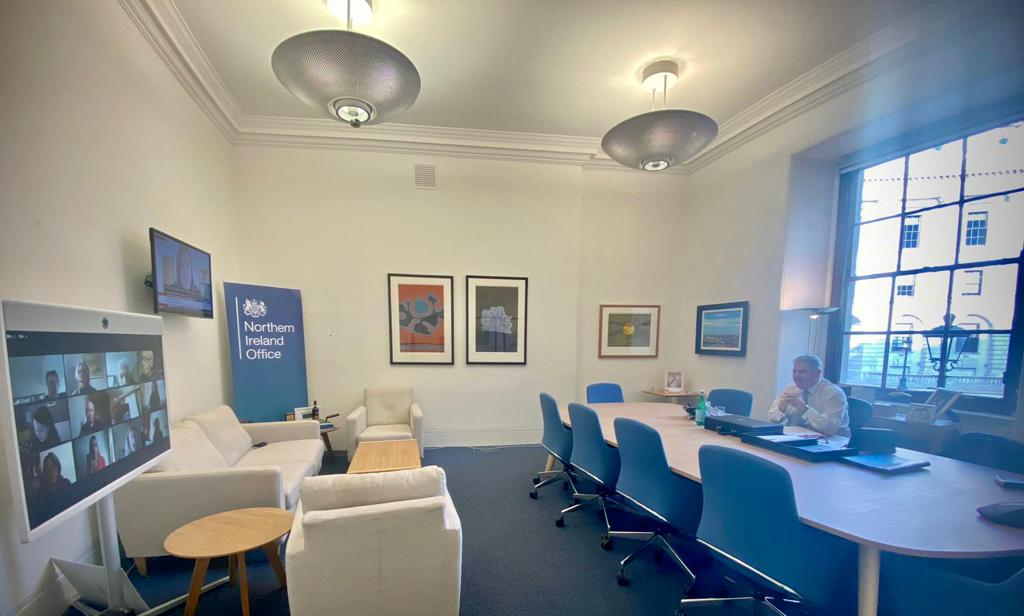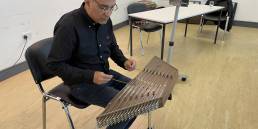As part of the Northern Ireland Centenary commemorations the Government appointed an historical advisory committee, to help examine interpret and increase our understanding of the events of 100 years ago. The Northern Ireland Office has taken a lead which underscores the first historic fact and that is Partition is not simply about the creation of Northern Ireland. It is in many senses the foundational event of the creation of the modern United Kingdom of Great Britain and Northern Ireland and also of the country which went on to become the Republic of Ireland.
As a project we aim to take the new thinking and new research and writing around Partition and Northern Ireland and distil it into educational and engaging material which will be aimed at what we have termed ‘new’ communities. This means those who are new to the subject like school children learning about it for the first time; or new communities who have made Northern Ireland their home but feel ill equipped too engage in current debates and discussions because they lack knowledge about the past, and finally those who visit or come to study here and are interested in just what makes our wee country so unique.
That process of distillation means we have been watching listening and learning ourselves over the past year. The project stage and volunteers have attended lectures, exhibitions, commemorations and events as well as reading widely on the topic. Now the second phase of the project is to take all that learning, and some of the great work done to date and use it to reach these ‘new’ audiences in ways that they can relate to and really understand.
 The project is a bridge between the great academic work, undertaken by the likes of the Historical Advisory Panel and other academic and experts, and ordinary people who often are unaware of the history and legacy of there past. Through our project we will introduce new audiences to these experts and their ideas and opinions. We will learn that history like many things is made up of different views and opinions and the truth rests somewhere in the middle. Our aim is to navigate the debates and to ensure that there is more light than heat produced.
The project is a bridge between the great academic work, undertaken by the likes of the Historical Advisory Panel and other academic and experts, and ordinary people who often are unaware of the history and legacy of there past. Through our project we will introduce new audiences to these experts and their ideas and opinions. We will learn that history like many things is made up of different views and opinions and the truth rests somewhere in the middle. Our aim is to navigate the debates and to ensure that there is more light than heat produced.
Therefore to introduce the Northern Ireland Office’s Historical Advisory Panel we have reproduced an interview by Chair of the Panel, Paul Bew, who outlines the composition and work of the panel, which he hopes will enable ccess to new and challenging theories and opinions on Northern Ireland’s past.
When I was asked by the Secretary of State to chair the historical advisory committee to be set up in the context of the commemoration of Northern Ireland’s first 100 years, I had mixed emotions. On the one hand, I had, in 2015, co-chaired with pleasure the UK parliament’s advisory committee for the commemoration of Magna Carta. This was obviously a great event in British history. But there was vigorous debate as to its meaning and, indeed, the deeper meanings of the 800 years of British history since then. What do we mean when we talk about the rule of law? Many declared their determination to resist an uncritical and romantic version of British history: one which emphasised liberty as opposed to oppression. I had three co-chairmen from the Commons, first the brilliant historian and Labour MP Tristam Hunt. Tristam had to resign when he was promoted to the Shadow Cabinet. Then there was the very able Tory MP Sir Peter Luff and finally, after Sir Peter’s retirement from the House of Commons, there was Kwasi Kwateng, now the Business Secretary.
All of them prioritised giving a platform to the widest possible debate and the widest possible range of historical meanings. Not everyone loved our work. Westminster Hall was for several months employed to display artwork celebrating various popular struggles and key moments of democratic reform. Some complained it had been transformed into an agitprop chamber. I don’t think anyone felt, however, that we had sponsored a sentimental or chauvinist view of the British past. I knew, therefore, it is both possible and essential to do this type of work. It is important to respect our history — otherwise the price is a loss of self-knowledge. But it is also important not to be afraid of illuminating its controversial aspects.
But I knew Northern Ireland as well. I knew the passions connected with the issue of partition. No matter how much we wanted to be historically objective — would anyone accept our committee’s good faith?
I was very lucky in that I was able to win the support of both of some long-established scholars and also a number of young historians who brought with them a wide range of differing perspectives. They were united only by the excellence and professionalism of their published work. Marie Coleman of Queen’s University Belfast and Caoimhe Nic Dháibhéid of Sheffield University were already well known to me because of their important books on twentieth century Irish history. Niamh Gallagher, now a don at St Catherine’s College, Cambridge, was the author of a prize-winning book on Ireland and the First World War. Brian Barton, a Fellow of the Royal Historical Society, had published much important work on twentieth century Ireland but more recently was most celebrated for his book on the blitz in Belfast. Henry Patterson had written many important works, including The Politics of Illusion, his analysis of modern republicanism, but was most important to us for the original and pathbreaking in 1980 on the sectarian conflict which accompanied the establishment of Northern Ireland, establishing the mass expulsion of Catholic workers from the shipyards in 1920. Professor Graham Walker’s books display an unequalled understanding of the historic devolution experiment in Northern Ireland. Like myself, Margaret O’Callaghan began her doctoral work in Cambridge on the Irish agrarian problems of the 1880s. But, also like myself, she has moved to the twentieth century for many of her subsequent publications. She has particularly scholarly interests in commemoration and the Boundary Commission.
|
“The centenary of Northern Ireland is contested. In December 1920 when the Government of Ireland Act partitioned the island of Ireland into two separate entities, few could have imagined that partition would continue to shape northern political identities into the twenty-first century. Whether one marks, acknowledges, remembers, celebrates or boycotts the centenary, Northern Ireland has had a turbulent history from which no single narrative can be drawn. The purpose of the Historical Advisory Panel is to consider the history of Northern Ireland in all its complexity. It has been appointed by the British Government as part of the Northern Ireland centenary project to deal with the ‘historic elements’ surrounding its creation. The panelists are drawn from diverse backgrounds and their recommendations are strictly independent from governmental influence. At an individual level they have divergent views on explaining aspects of Northern Ireland’s history, but they all agree that the Panel’s responsibility is to encourage an inclusive, holistic, and ‘messy’ history of Northern Ireland in order to aid understanding of the lived experiences of a wide variety of groups and individuals who lived through the tumultuous events of 100 years ago. The Panel will engage with both familiar and less familiar events pertinent to the early years of the region’s history. From the foundation of labour and rise of trade unionism to the campaign for suffrage — particularly the enfranchisement of women —– several forms of politics exercised its inhabitants in the decades before and after 1921, many of which complemented divides over the constitutional question but also created allegiances on other bases. Questions regarding society, the economy and culture are also part of the holistic way in which the Panel is exploring the centenary, which is being considered in wider contexts and longer chronologies both within the island of Ireland and UK but also within other important frameworks including the former British Empire and European Union.” |
On the eve of the century of Northern Ireland on 4 May 2021, we published our manifesto in the Belfast News Letter, Irish News and Irish Times:
The committee has thrown itself into a mass of activities, engaging with local councils, schools and academics. There have been numerous public lectures, delivered online due to Covid, numerous engagements in public conversations, notably at Belfast City Hall and, involving the entire committee of the Ulster Museum. We have been on everything from the Aspen Institute to the History Ireland Hedge school webinar, with a slew of BBC interventions in between. We have projects for an exhibition later in the year and, possibly, public health requirements permitting, more public gatherings. We very much hope to leave as the legacy, thanks to our engagements with the Public Records Office of Northern Ireland – a fuller archival record of Northern Ireland. In this respect, we want to illuminate economic realities as well as political debate. Above all, when we have finished our work, we hope that anyone who is curious about the Northern Irish past will have access to new and challenging theories and opinions.
In my own personal blog on the creative centenaries website I have tried to explore sympathetically the qualities, often unexpected, and defects of Ulster’s two great political leaders in 1921: James Craig and Joe Devlin. Stormont’s iconography has a key place for James Craig who took great personal risks for peace in 1921/1922. It should now include a place for Joe Devlin, always a man of peace and great friend of the working people of the city. This would be in the spirit of the new Northern Ireland which has been the reality since the Agreement of 1998.
Paul Bew is a historian and Emeritus Professor at Queen’s University Belfast. He is a cross-bench life peer and Chairman of the House of Lords Appointments Commission.




